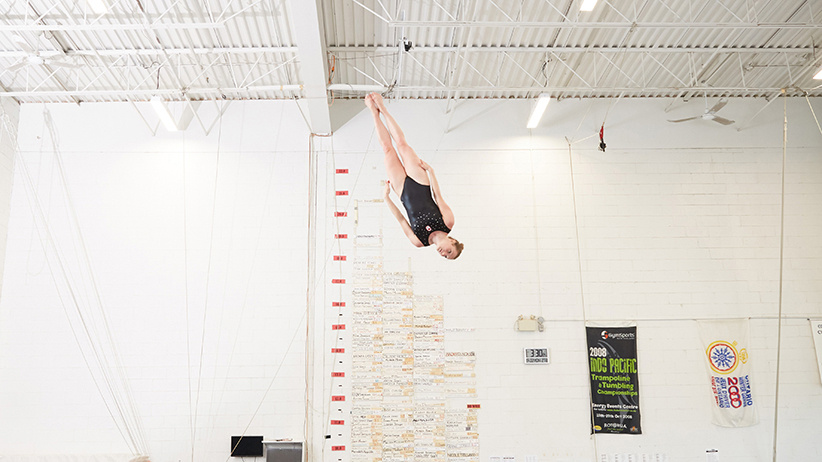Rosie MacLennan reaches for the top at the Pan Am Games
Trampoline gymnast and Olympic gold medallist Rosie MacLennan has only two gears for competition: tough and tougher
June 22, 2015 -Rosie McLennan practices along side athletes for the upcoming Pan American games at the Skyriders Trampoline place in Richmond Hill. (Photograph by Sandy Nicholson)
Share

It wasn’t always easy for Rosie MacLennan to explain that she made a living by jumping on a trampoline. Before she was Canada’s lone gold medallist at the London 2012 Olympics, before she needed to hire an agent to organize her speaking engagements, before media lobbied to watch her train at what was once an automobile garage in Richmond Hill, Ont., she was one of Canada’s top athletes in a little-talked-about sport.
“Before, it was just school and trampoline,” says her teammate and mentor Karen Cockburn. “Now, it’s school, trampoline and appearances.”
At 26, MacLennan’s trophy case is filled with her Olympic gold: a world championships gold from 2013 in Sofia, Bulgaria, and a Pan Am Games gold from 2011 in Guadalajara, Mexico. But after winning nearly every major accolade in the sport, “I wasn’t ready to be done,” she says. She wanted more of the day-to-day grind of training and competition, which is why she still comes back to Skyriders Trampoline Place, a nondescript building in suburban Toronto, where the floors were dug out long ago to install built-in trampolines.
Her competitors will be just as determined, and they have various strategies to beat the five-foot-two native of King City, Ont. “Some athletes are going for lower difficulty, but really focusing on jumping higher and cleaner,” MacLennan says. “Other athletes are going for broke for difficulty.”
Her long-time coach makes no qualms about which of these two camps MacLennan is in. “We want her to have the hardest routine, do it the highest and do it the best,” says Dave Ross, “which is hard.”
Part of that would include three triple somersaults in a single routine (most of her competitors only try for two), which MacLennan successfully completed for the first time at last year’s world championships. But, “if it’s not quite ready [for the Pan Ams],” she says, “I’m not going to risk it.”
The risk may not be worth the reward, not with the 2015 world championships later this year. MacLennan has to defend her Pan Am gold medal in Toronto, yes, but her main focus is ramping up her training to peak in November, when the top finishers will get an automatic spot at the 2016 Olympics in Rio de Janeiro.
Since winning Olympic gold, MacLennan has remained relatively injury-free, aside from hurting her ankle during a game of soccer-baseball in 2013 while running the bases. “We’re not always that coordinated on the ground,” she laughs. MacLennan’s coach says her current fitness is close to what it was when she went to the London Games, and he has no intention of letting her coast to the podium.
A common mistake some athletes make in trampoline, according to Ross, is playing it too conservatively in the early-round routines; they think that if they don’t make a mistake, they’ll sneak into the top eight for the finals. When scores reset for the final round, the average person might have the impression that everyone has an equal shot, but that isn’t what happens in a sport with judges.
“If you want to win, you have to be in the top four or three [going into the final round],” Ross says. “Before you get on the trampoline, somewhere in the back of the judge’s mind is, ‘This person could win it.’ You have to create that aura, or you’re not going to win.”
Competitors are judged on the degree of difficulty for their routines, as well as their times of flight. The biggest component, worth about half the final score, is their execution. “These are human judges deciding whether a skill that you just did was perfect, or almost perfect,” Ross says.
It’s the harsh reality of judged sport, but that doesn’t mean MacLennan will rely on her name recognition. If she wants to repeat her Olympic victory, she’ll have to step up her degree of difficulty yet again. “In London, there were only two of us doing above 15 points of difficulty,” MacLennan says. “Now, you can see a lot of girls are pushing to get to that point.”
For the Pan Am Games, she has two routines she’s been fine-tuning: one more conservative and the other more difficult. Which one she performs on competition day will depend not only on how confident she’s feeling, but how the equipment feels. A new skill in her repertoire includes a triple back flip with a full twist. “Only two other girls have done it in competition before,” Ross says. “Rosie has an edge that everybody in the room knows; she has the hardest routine.” And if she flies highest, she’ll be tough to beat.